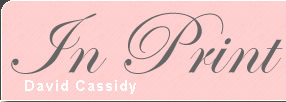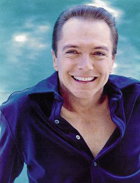
The Third Degree with ...
David Cassidy
By Justin Cord Hayes
From Las Vegas Weekly
October 28 1998
David Cassidy has been wowing audiences onstage in the MGM's multimillion dollar stage show EFX for the last two years. All naysayers who believed that he could never fill the shoes of EFX's former lead Michael Crawford (the erstwhile Phantom of the Opera) have been proved wrong. The show is a great success, in no small part to the charisma and charm of Cassidy, who has been in the public eye since he first appeared as Keith Partridge on the immortal 1970s classic The Partridge Family. As of December, Cassidy will leave EFX in order to support his newest album, Old Trick New Dog. He's a busy man, but he still took time to be subjected to The Third Degree.
1. What's next for David Cassidy?
 CASSIDY: Some casino and tour dates. My new single ("No Bridge I Wouldn't Cross") is about to chart, and it's only been out for four weeks--it, and the new album--are really, really building. So I felt it was the time to leave EFX; I told them earlier in the year that I'd let them know by the end of the summer if I'd be continuing with the show (or not). I need more time to do all the things that I'd like to do. But first, I'm going to take a couple of weeks' vacation, since I haven't had more than four days off at a time in the last five years. Ultimately, by the third quarter of 1999, I intend to open another show for another property in town, but I can't really give any details about that yet. I'd like to start a show from scratch instead of coming in to save an existing one.
CASSIDY: Some casino and tour dates. My new single ("No Bridge I Wouldn't Cross") is about to chart, and it's only been out for four weeks--it, and the new album--are really, really building. So I felt it was the time to leave EFX; I told them earlier in the year that I'd let them know by the end of the summer if I'd be continuing with the show (or not). I need more time to do all the things that I'd like to do. But first, I'm going to take a couple of weeks' vacation, since I haven't had more than four days off at a time in the last five years. Ultimately, by the third quarter of 1999, I intend to open another show for another property in town, but I can't really give any details about that yet. I'd like to start a show from scratch instead of coming in to save an existing one.
2. Why did you decide to rerecord "I Think I Love You"?
CASSIDY: It's the record that I'm most associated with and the one that people play and play and play--it's had an influence on a couple of generations now. So it's an integral part of my recording career and belonged to my first triple platinum album. I love that people associate me with it. It's nothing all that different from Elton John rerecording "Candle in the Wind" or Eric Clapton releasing a new version of "Layla"--those are their signature songs, and ("I Think I Love You") is mine. I also released it to show that I've embraced all of it: the past, present and future.
3. What do you feel is the best time of your lengthy career in show business?
CASSIDY: I can honestly say that this is the best time of my career because now I'm doing more stuff that I've always wanted to do, and throughout, my fans have proven loyal over the decades--they pay to see me, buy my records, see my shows. I'm constantly proving to people that I'm not a fluke.
4. Isn't it a drag to feel that you still have to prove that?
CASSIDY: No, because in the 1970s I moved on (from my early wave of success) at a time when I was on top. John Lennon did the same thing, and I'd talk to him about it. I don't know...maybe if I'd had three other guys to share the success with I would have stayed in it longer. But I felt that I needed to "demystify" myself. I mean, you have to keep in mind that the world's very different now. In the '70s there was no video no MTV. We were considered superstars then and made into figures that weren't really who we were at all. Besides, for me the emphasis has always been on the work--not the fame or money. If you focus on the work, everything else comes along.
5. Is it hazardous to achieve fame at an early age?
CASSIDY: No question about it; it's a double-edged sword. We all want to be successful, but, and I swear this is true, I never had any designs for becoming a "superstar." I just wanted to act, like my father (Broadway actor Jack Cassidy), and have him appreciate me for my talents. Both my parents were actors/singers who never made it really big, but they both starred in numerous Broadway plays. So, from my first memories, my frame of reference in this business has been the work itself--not fame, not money. I survived a remarkable experience at a young age--during my last concert appearances in the '70s, I was playing to audiences of 40-60,000 people, and then I left. I wanted to see what else David Cassidy could do. I didn't want to compete with my fame, so I took a few years to decide on a new course. So I did regional theater, created shows, produced music, wrote music that others recorded, played Broadway. The opportunities for good work weren't around as much in the '80s, but I've always worked. Forget about money and being a superstar...do the work that makes you happy.
6. What makes you happy?
CASSIDY: Many things: being able to appreciate all of the things that I have in my life--especially my wife and son, being able to have such loyal support from the community and from my fans. That's why I've done a lot of charity work in Las Vegas, so that I could give something back to the community.
7. Would you support your son if he decided to go into show business?
CASSIDY: As long as it's in his best interest, anything he decides to do I will support. I mean, if he were to decide to have a high wire act I'd think twice--like me, he's afraid of heights. I even had to go to a hypnotist to overcome that fear of heights so that I could be in EFX. My son sings well and wants to be an actor. It would make sense, since he's always seen me working on TV, EFX, Broadway. He's seen me both in front of the camera and behind the scenes. I think we associate strongly with our male role models, and I'm certainly my son's. I've tried to make him aware of how lucky and fortunate I am and to make sure he understands that going into this business (with a well-known name) doesn't give you any guarantees.
8. What are the best and worst things about Las Vegas?
CASSIDY: The best: quality of life and community--I really, truly love it. My son goes to public school; my wife and I are involved in it. She wrote songs for them to use when they walk into school in the morning. Many people here have chosen Las Vegas as an alternative to really large cities like L.A. or Chicago because the quality of life really is better here. The worst: The roads are dangerous here due to 24-hour liquor licenses and tourists staring at all of these wonderful buildings we have instead of the roads. I believe that we have more fender benders than any other city, so we all need to be very cautious and pay close attention.
9. What acting role would you most love to perform?
CASSIDY: I don't know how to answer that. There are things I'd love to do that I'm not right for physically or because of people's perception of me. I'd love the Zero Mostel role in The Producers, for instance.
10. Any thoughts on those infamous nude photos by Annie Liebowitz that appeared in Rolling Stone?
CASSIDY: I've always had great thoughts about that shoot and about Annie. I thought the photos were beautiful, not lewd. After all, it WAS the 1970s, a time of personal freedom, a very different time. The success of the pictures and the story helped elevate both Annie and myself. At that time, Rolling Stone wasn't a mainstream showbiz magazine; it had covers featuring Hendrix and the Velvet Underground. And then, there I was on the cover...Jann Wenner (Rolling Stone editor) laughed all the way to the bank. At the time I did the shoot speaking as a 24-year-old guy and not as the 17 year old I played on The Partridge Family.
11. Partridge Family vs. The Brady Bunch.
CASSIDY: No idea. Don't even ask me. I've never even watched The Brady Bunch, and I haven't even seen all of The Partridge Family episodes--I was too busy working on them to see them.
